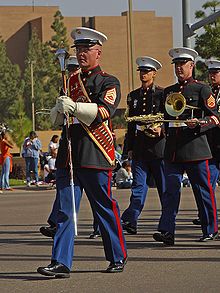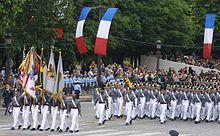- Parade
-
This article is about a procession. For other uses, see Parade (disambiguation).
 A United States Marine Corps band on parade.
A United States Marine Corps band on parade.
A parade (also called march or marchpast) is a procession of people, usually organized along a street, often in costume, and often accompanied by marching bands, floats or sometimes large balloons. Parades are held for a wide range of reasons, but are usually celebrations of some kind. In Britain the term parade is usually reserved for either military parades or other occasions where participants march in formation; for celebratory occasions the word procession is more usual. In the Canadian Forces the term also has several less formal connotations.[1]
Protest demonstrations can also take the form of a parade, but in such cases are usually referred to as a march instead.
Contents
Parade float
Main article: Float (parade)The parade float got its name because the first floats were decorated barges that were towed along canals with ropes held by parade marchers on the shore[citation needed]. Floats were occasionally propelled from within by concealed oarsmen, but the practice was abandoned because of the high incidence of drowning when the lightweight and unstable frames capsized. Strikingly, among the first uses of grounded floats — towed by horses — was a ceremony in memory of recently drowned parade oarsmen.[citation needed] Today, parade floats are traditionally pulled by motor vehicles or powered themselves.
Aircraft and boats
Since the advent of technology, it is possible for aircraft and boats to parade. A flypast is an aerial parade of anything from one to dozens of aircraft, both in commercial context at airshows and also to mark, e.g., national days or significant anniversaries. They are particularly common in the United Kingdom, where they are often associated with Royal occasions. Similarly, for ships, there may be a sail-past of, e.g., tall ships (as was seen during Trafalgar 200) or other sailing vessels as during the celebrations of the 60th anniversary of World War II.
Longest parade
The longest parade in the world is the Marksmen's Parade that takes place in Hanover every year during the Schützenfest. The parade is 12 kilometres long with more than 12,000 participants from all over the world, among them more than 100 bands and around 70 floats and carriages.
Types of parades
 In 2002, United States Military Academy (West Point) cadets opened the Bastille Day Military Parade, Paris, France, as guest troops.
In 2002, United States Military Academy (West Point) cadets opened the Bastille Day Military Parade, Paris, France, as guest troops.
- Cavalcade
- Flypast
- Flower parade
- Parade of horribles
- Pride parade
- Santa Claus parade
- Technoparade
- Ticker-tape parade
- Military parade
- Victory parade
- Walking day
Parade examples
- Attestation Parade New South Wales Police College graduation parade in Goulburn, New South Wales, Australia.
- Anheuser-Busch Washington's Birthday Parade, held annually in Laredo, Texas
- Bastille Day Military Parade - Held annually in Paris, France in celebration of the Bastille Day
- Calgary Stampede Parade
- Carnaval San Francisco
- Chief of Defence Force Parade - Australian Defence Force Academy - Marks completion of Initial Military Training for Officer Cadets and Midshipman at ADFA
- Dahlia parade in Zundert always held on the first Sunday in September
- Days of '47 Parade in Salt Lake City
- Dragon of Shandon Samhain parade in Cork, held annually on the 31st of October at night
- Easter parade
- International Bank of Commerce "Under the Stars" youth parade, held annually in Laredo, Texas
- Macy's Thanksgiving Day Parade
- Mardi Gras
- Main Street Electrical Parade
- Marksmen's Parade, Hannover
- May Day Parade Russia
- Mummers Parade
- New York's Village Halloween Parade
- Notting Hill Carnival
- Orange Bowl Parade
- Orlando Citrus Parade
- Philippine Independence Day Parade
- Procession of the Species
- Republic Day Parade in India
- Republic Day Parade in Pakistan
- Saint Patrick's Day Parade Dublin, Munich, New York, Boston, and San Diego
- Toronto Santa Claus Parade
- Tournament of Roses Parade
- Victory Day parade, held annually in the Russian Federation and former USSR.
- Vikingland Band Festival Parade Marching Championship
- Walt Disney World Christmas Day Parade
- West Country Carnival
- Zinneke Parade
Observances marked by parades
 A kiddie parade at a Municipal Band concert in Eau Claire, Wisconsin
A kiddie parade at a Municipal Band concert in Eau Claire, Wisconsin
- Anzac Day - Australia and New Zealand
- Canada Day
- Caribana
- Carnival
- Christmas
- Easter
- Independence Day
- Labor Day
- Mardi Gras
- New Year's Day
- Pioneer Day (Utah) - Days of '47 Parade
- Samhain Ireland
- Schützenfest
- Solstice
- Thanksgiving
- St. Patrick's Day
- Puerto Rican Day Parade
- Army's Day
- Parade Week - A week of drinking at Binghamton. All student are required to go H.A.M.
(Nov3-Nov10)
See also
Notes
- ^ An evening parade in the reserve force refers to any assembly of troops for a period of instruction, drill, or office work while a first parade refers to a preliminary inspection of a vehicle before a road march. A C.O.'s Parade is an inspection by the Commanding Officer. There are also Defaulters Parades and Kit Parades.
External links
Categories:- Festivals
- Parades
- Street culture
- Walking
Wikimedia Foundation. 2010.


